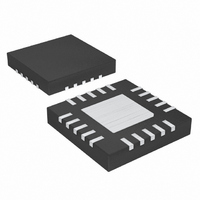MAX6964ATG+ Maxim Integrated Products, MAX6964ATG+ Datasheet - Page 6

MAX6964ATG+
Manufacturer Part Number
MAX6964ATG+
Description
IC LED DRIVER LINEAR 24-TQFN
Manufacturer
Maxim Integrated Products
Type
Linear (I²C Interface)r
Datasheet
1.MAX6964AEG.pdf
(23 pages)
Specifications of MAX6964ATG+
Topology
Open Drain, PWM
Number Of Outputs
17
Internal Driver
Yes
Type - Primary
Backlight, LED Blinker
Type - Secondary
RGB, White LED
Frequency
400kHz
Voltage - Supply
2 V ~ 3.6 V
Voltage - Output
7V
Mounting Type
Surface Mount
Package / Case
24-TQFN Exposed Pad
Operating Temperature
-40°C ~ 125°C
Current - Output / Channel
50mA
Internal Switch(s)
Yes
Number Of Segments
12
Low Level Output Current
50 mA
Operating Supply Voltage
2 V to 3.6 V
Maximum Supply Current
122.1 uA
Maximum Power Dissipation
1666 mW
Maximum Operating Temperature
+ 125 C
Mounting Style
SMD/SMT
Minimum Operating Temperature
- 40 C
Lead Free Status / RoHS Status
Lead free / RoHS Compliant
Efficiency
-
Lead Free Status / Rohs Status
Details
The MAX6964 is a general-purpose output (GPO)
peripheral that provides 17 output ports, O0–O16, con-
trolled through an I
outputs sink loads up to 50mA connected to external
supplies up to 7V, independent of the MAX6964’s sup-
ply voltage. The MAX6964 is rated for a ground current
of 350mA, allowing all 17 outputs to sink 20mA at the
same time. Figure 1 shows the output structure of the
MAX6964. The outputs default to logic high (high
impedance unless external pullup resistors are used)
on power-up.
The two blink phase 0 registers set the output logic lev-
els of the 16 outputs O0–O15 (Table 6). These registers
control the port outputs if the blink function is disabled.
A duplicate pair of registers, the blink phase 1 regis-
ters, are also used if the blink function is enabled
(Table 7). In blink mode, the outputs can be flipped
between using the blink phase 0 registers, and the
blink phase 1 registers using hardware control (the
17-Output LED Driver/GPO with
Intensity Control and Hot-Insertion Protection
Figure 1. Simplified Schematic of I/O Ports
Figure 2. 2-Wire Serial Interface Timing Details
6
_______________________________________________________________________________________
SHIFT REGISTER
WRITE PULSE
DATA FROM
SDA
SCL
t
Output Control and LED Blinking
HD,STA
START CONDITION
REGISTER
2
OUTPUT
D
C
C-compatible serial interface. All
PORT
K
FF
Functional Overview
Q
Q
t
LOW
OUTPUT PORT
REGISTER DATA
t
R
t
SU,DAT
t
HIGH
t
F
Q2
I/O PIN
GND
t
HD,DAT
t
REPEATED START CONDITION
SU,STA
BLINK input) and/or software control (the blink flip flag
in the configuration register) (Table 4).
The 17th output, O16, is controlled through 2 bits in the
configuration register, which provide the same static or
blink control as the other 16 outputs (Table 4).
The logic level of the BLINK input may be read back
through the blink status bit in the configuration register
(Table 4). The BLINK input, therefore, may be used as
a general-purpose logic input (GPI port) if the blink
function is not required.
The MAX6964 includes an internal oscillator, nominally
32kHz, to generate PWM timing for LED intensity con-
trol. PWM intensity control can be enabled on an out-
put-by-output basis, allowing the MAX6964 to provide
any mix of PWM LED drives and glitch-free logic out-
puts (Table 8). PWM can be disabled entirely, in which
case all outputs are static and the MAX6964 operating
current is lowest because the internal oscillator is
turned off.
PWM intensity control uses a 4-bit master control and 4
bits of individual control per output (Tables 11 and 12).
The 4-bit master control provides 16 levels of overall
intensity control, which applies to all PWM-enabled out-
puts. The master control sets the maximum pulse width
from 1/15 to 15/15 of the PWM time period. The individ-
ual settings comprise a 4-bit number, further reducing
the duty cycle to be from 1/16 to 15/16 of the time win-
dow set by the master control.
For applications requiring the same PWM setting for all
output ports, a single global PWM control can be used
instead of all the individual controls to simplify the con-
trol software and provide 240 steps of intensity control
(Tables 8 and 11).
t
HD,STA
t
SU,STO
PWM Intensity Control
CONDITION
STOP
t
BUF
CONDITION
START












